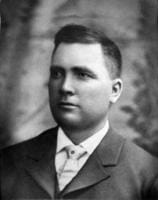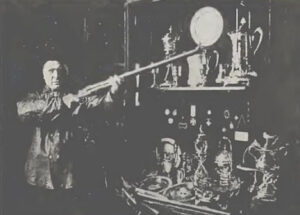
‘Josh’ Wayper was a longtime and well-known Hespeler resident and hotel owner, but his biggest claim to fame was his skill as a marksman.
Born in Durham, England, in 1858, he later owned the Queen’s Hotel in Hespeler where his many shooting trophies and stuffed animals were displayed. He was also a co-founder of the Hespeler Gun Club, formed in 1883, and was active in the club for many years.
Wayper and his father—Joseph Wayper (Sr.), who was born February 14, 1824 at Hamsterley, Durham, England—were hotel keepers at Hespeler’s Queens Hotel, at the corner of Queen and Guelph Road.
Winfield Brewster, who wrote several books chronicling local history, noted that the Waypers arrived in Hespeler from a hotel at Guelph Junction on the Grand Trunk Railway. Before that, they ran an establishment “east of Elora in the country.”
Brewster tells a good yarn regarding a goat owned by Wayper wandering along one spring morning when Christian Pabst, who was supervising construction of the Queen’s Hotel, was sitting back in his chair leaning against the bar wall reading his newspaper when he dozed off. “Just then came along Wayper’s goat (which) grabbed the paper out of his hands,” and sped away up on top of a stone pile out back, where the goat proceeded to eat the paper “amid the imprecations of the old gentleman in his native German.”
Around the time the Waypers arrived in the Hespeler area, it was common for young men to enlist in volunteer infantry units.
Rifle-shooting had long been popular in British North America and was encouraged by the government of Canada in the years following Confederation. Shooting matches were social events; they were fun and competitive, and were also seen as manly and patriotic.
The Dominion Rifle Association held its first national championship in 1868, but even before this, the National Rifle Association of England had invited British North American teams to compete at its annual championships, first at Wimbledon Common and, after 1890, at Bisley Common.
Canada’s federal government funded a national team to compete in England from 1872 through the turn of the century.
By 1869, two years after Confederation—Hespeler’s population was 767 in 1867—a drill shed and rifle ranges had been erected at present-day Milling Road, leading to the formation of local shooting associations and annual shooting competitions. Wayper excelled in these shooting matches and together with other local sharpshooters Peter Jardine, John W. Gilchrist and John Limpert, represented Canada at the National Rifle Association matches in England.
In those early years the first shooting range was on the northwest corner of Fishermill and Guelph Avenue, where shooters fired at iron plates on the hillside; the plates were painted white with a black bullseye and rings.
Wayper’s Queen’s Hotel has a long history, and appears as “The Tavern Lot” on a plan dated 1846, before the Waypers arrived in the area. From 1866-68 Stephen Flynn ran the hotel, followed by Michael Haller from 1868-1871, John Fields (1872-73) and James Baker (1874-86), who called it “The Baker House.” It was after this that the Waypers took over.
Josh’s father died May 1, 1904 at the Queen’s Hotel, while his mother, Hannah Wilson, who was born Christmas day 1824 in Durham, died January 28, 1909, in Hespeler. The two were married at Weardale in Durham County in the autumn of 1845.
Setting up in the hotel business at a place like Hespeler was not without its difficulties in the mid-to-late nineteenth century. Anywhere alcohol was served, whether it be at a barn-raising or at a tavern, fights and disagreements were not uncommon.
On a December night in 1894 a drunken man named Jim Crane drove his wagon and team of horses into mill pond above Holm’s Mill. They all perished. Wayper was charged and convicted for his part in allowing the deceased to drink to excess. Substantial damages were awarded to the destitute Crane family—there were three girls and a boy in addition to Mrs. Crane. Wayper was ordered to pay her $300 in damages, while the other hotel proprietor, Thomas Hunt, was ordered to pay $600.
Following this, hotel proprietors were careful to restrict the flow of alcohol consumed by their customers.
Shortly before this incident, Wayper founded the Hespeler Gun Club—it was formed in 1883—and was an active member for many years. The Hespeler Rifle Association was dissolved following the First World War. The Hespeler Gun Club was discontinued in the 1960s.
In 1896, Hespeler’s four-man team, led by Wayper, won the Ontario championship, breaking 94 of 100 clay pigeons. In 1901, Wayper was Canadian wing shooting champion, killing 199 of 200 live pigeons to equal the world record. He was also a three-time Canadian trapshooting champion and won the Ontario championship gold medal several times.

In addition to local shooting matches, some of the top marksmen would attend the annual matches in Toronto and Ottawa, and then the best among them would represent Canada at the National Rifle Association matches in England. Wayper was a member of the Canadian team that went to England for the Bisley competition. Over the course of his career, Wayper also won many minor events.
Wayper was an active hunter; his hunting exploits were often reported in local newspapers, along with social news. On one occasion Wayper and Tremayne, also of Hespeler, along with Mr. Homuth of Preston, Dr. A.C. Jones of Kilbride, and B. Brown of Carlisle, all members of the Hespeler club, hunted on the Moon River in Muskoka, having arrived there from Penetanguishene. Despite Wayper’s skill as a marksman they had poor luck with the deer on that outing, bagging only three, “but they more than made up for this by their success with rarer game.” Dr. Jones killed a bear, as did Wayper, while Brown killed a wolf.
Wayper will be forever associated with Hespeler, but so too with nearby Puslinch Lake, where he owned several cottages. In an April 12, 1907 story appearing in the Galt Reporter, Wayper was described as having made preparations for the erection of his own large summer hotel. Over the years Wayper participated in several pigeon shooting matchs at the lake in the winters. After the match the losing side treated the winning party to supper at the hotel.
Josh Wayper, an Anglican, died in 1915 and is buried in Hespeler’s New Hope Cemetery.
